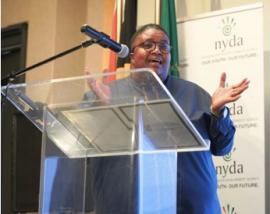
State institutions have been challenged to continue to provide mentorship and support programs for women and challenge gender stereotypes by promoting a culture of inclusion across the various sectors.
Speaking at the Young Women’s Professionals Network, hosted by the National Youth Development Agency (NYDA) in Johannesburg on Monday, Department of Women, Youth and Persons with Disabilities Deputy Minister, Steve Letsike, emphasised that empowering women is directly linked with the emancipation of society as a whole.
Letsike said the economy covers a wide range of economic activities, including amongst others, fisheries which currently contributes around R30 billion to the economy and supports over 127 000 jobs. She said the tourism ocean economy contributes around R40 billion alone to the tourism sector each year while the mining and minerals; financial services; agriculture; and offshore oil and gas contributes around R10 billion to the economy.
“These are, but some of the sectors that the South African women are entitled to be a part of, particularly as the country continues to prioritise the participation of women in the economy. According to a 2021 report by the World Bank, women in South Africa make up only 44% of the workforce, and they hold only 27% of managerial positions,” Letsike said.
The Deputy Minister emphasised the importance of continuing to work towards greater gender diversity in the workforce and encouraged more women to enter the workforce and pursue careers in science, technology, engineering and mathematics (STEM) fields.
“We must ensure that we promote women's economic rights and independence, including access to employment, appropriate working conditions and control over economic resources; facilitate women's equal access to resources, employment, markets and trade; provide business services, training and access to markets, information and technology, particularly to low-income women.
“[We must also ensure that we] strengthen women's economic capacity and commercial networks; eliminate occupational segregation and all forms of employment discrimination; [and] promote harmonisation of work and family responsibilities for women and men,” Letsike said.
Letsike reiterated the call to the country to join in support and implementation of meaningful programmes, plans, policies, strategies and interventions geared towards unlocking barriers of entry for women, young women, and the largely unemployed population.
“We reiterate the call to all of society to grow the prospects of new entrants; develop tailored financial solutions that are inclusive; accelerate market access opportunities; and support sustainable enterprises to scale.
“Despite all these challenges faced by South African women, the 2022 Census data by Statistics South Africa demonstrates the impact that government programmes have had in alleviating poverty, reducing unemployment, and lessening inequality over the last 30 years,” Letsike said.
READ | Census 2022 results show SA’s development since 1994
– SAnews.gov.za


